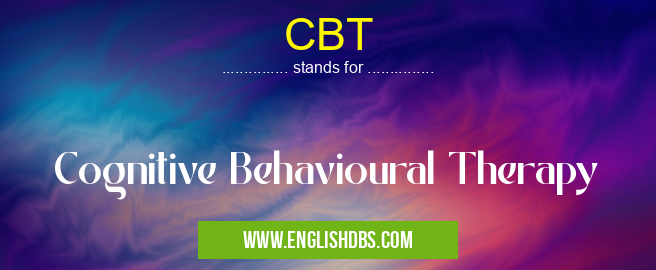What does CBT mean in MEDICAL
Cognitive Behavioural Therapy (CBT) is a form of psychotherapy that has been used as a treatment for various psychological issues for over four decades. CBT combines the abilities to increase awareness, quite destructive thought patterns and modify behaviour into an interrelated system. CBT helps people to challenge negative thoughts, understand why those thoughts are negative, and gradually replace them with healthier, more realistic ones. The goal of CBT is to help people become less distressed by their thoughts and experiences and act in ways that bring physical and emotional balance.

CBT meaning in Medical in Medical
CBT mostly used in an acronym Medical in Category Medical that means Cognitive Behavioural Therapy
Shorthand: CBT,
Full Form: Cognitive Behavioural Therapy
For more information of "Cognitive Behavioural Therapy", see the section below.
What Is Cognitive Behavioral Therapy?
Cognitive Behavioural Therapy (CBT) is a form of psychotherapy that uses evidence-based techniques such as cognitive restructuring (changing the way someone thinks about themselves or their situation); exposure techniques; relaxation training; self-management strategies; problem solving; interpersonal skills training; family therapy; behavior modification techniques; lifestyle management; psychoeducation (the education of a person on the subject of mental illness, its symptoms, diagnosis, management); and mindfulness meditation (being present in the moment). In other words, CBT teaches individuals how to identify unhelpful thinking patterns that lead to maladaptive behavior. By changing these patterns through deliberate thinking and behavior change, individuals can learn how to manage their emotions more effectively and develop healthier coping mechanisms.
How Does CBT Work?
CBT works by identifying unhelpful thought patterns that cause distress, such as excessive worry or rumination. Then it helps individuals develop new coping skills to deal with their negative emotions. The individual is taught how to recognise distortions in thought processes and replace them with more realistic interpretations. In addition, they are encouraged to experiment with different behaviours in order to get desired outcomes from challenging situations. This combination of reflective techniques along with practical tools enable individuals to overcome problems related to moods such as anxiety or depression but also optimising relationships values etcetera.
Essential Questions and Answers on Cognitive Behavioural Therapy in "MEDICAL»MEDICAL"
What is Cognitive Behavioral Therapy (CBT)?
Cognitive Behavioral Therapy (CBT) is a type of psychotherapy that emphasizes the role of thinking in how we feel and what we do. It looks at how people’s thoughts, beliefs, and attitudes affect their feelings and behaviors. CBT is used to treat a wide range of issues including depression, anxiety, phobias, substance abuse, eating disorders, relationship problems, and chronic pain.
How does CBT work?
Through CBT therapy sessions, individuals learn to identify and challenge distorted or negative thought patterns that are causing them distress and replace them with more realistic thoughts. This helps individuals gain insight into their problems which allows for alternative solutions to be explored. In addition to discussing thoughts and behaviors surrounding an issue during sessions, the therapist may also assign homework tasks between sessions which focus on changing problem behaviors or cognitions in order to achieve his/her therapeutic goals.
Does CBT require medication?
No; while some mental health issues can be treated with medication in combination with CBT therapy sessions, it is not required for treatment with this therapeutic modality.
What can I expect during a typical session?
During an initial session with a therapist who specializes with CBT techniques, you will typically spend time discussing your personal history surrounding the presenting issue as well as explain why it has become problematic in your life. The therapist may ask questions about current behaviors surrounding the issue such as how often it occurs and when it began to help understand the problems better. The therapist will then develop a personalized treatment plan incorporating strategies from CBT techniques that will be carried out throughout the course of future sessions along with any assigned “homework” tasks outside of the office environment.
How long does treatment usually last?
Treatment duration can vary depending on each individual case and the progress made throughout therapy; however most people will see significant improvement after 8-10 weeks of regularly scheduled therapy sessions combined with at-home assignments.
Final Words:
In conclusion, Cognitive Behavioural Therapy (CBT) is a highly effective form of psychotherapy for treating various psychological issues including helping people overcome fear/anxiety disorders and depression but also helping them become balanced emotionally through learning key life coping mechanisms while reevaluating thinking styles which may be causing unwanted behaviors/emotions. It seeks through various practical methods such as cognitive restructuring conversational therapy/skill building activities - encourage clients think differently about experiences whilst developing healthy coping strategies leading towards greater general wellness states!
CBT also stands for: |
|
| All stands for CBT |
